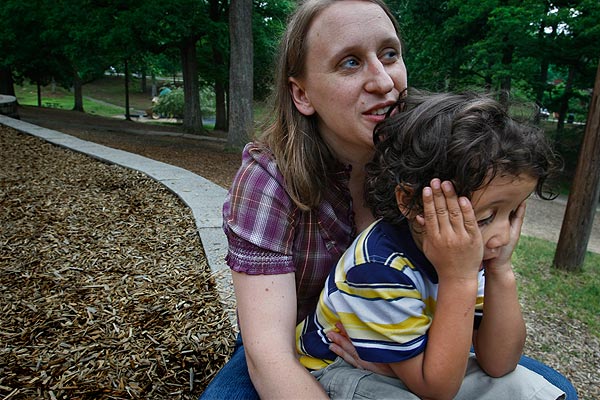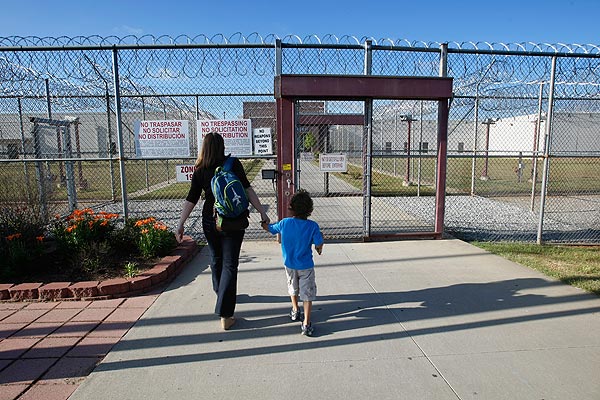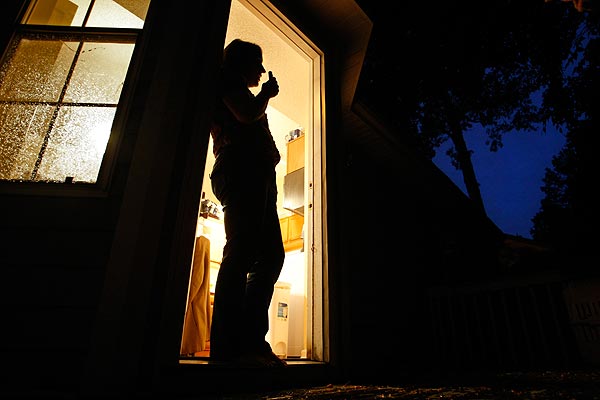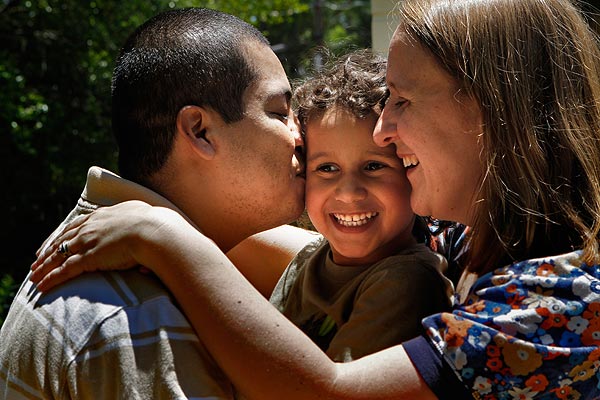Could he be a good American?
Pedro Guzman was brought to the U.S. from Guatemala by his mother when he was 8. Now 31, with a wife and 4-year-old son, his legal status in the U.S. has been rejected and he faces the prospect of deportation and separation from his family.
Reporting from Chapel Hill, N.C. — On a bright Saturday morning, Emily Nelson Guzman packed a beet-red Prius for the journey that would take her once more to Lumpkin, Ga., with its forlorn town square and sleepy barbecue joint and the nation's largest immigration detention center.
Her husband was there, locked away. Nineteen months earlier, federal agents had arrested him in his yard.
She loaded into the Prius a bag holding the old tight jeans she could finally squeeze into again, the ones she would model so he could see, through the visitation window, how much weight she had lost.
She loaded in another bag, full of action figures -- the Shazams and Spider-men and Power Rangers her little boy pretended to be when he fantasized about setting his father free.
The New Latino South
The Latino population in the South has grown dramatically over the last decade. This is one in a series of occasional stories chronicling the lives of Latinos in a changing region.
Georgia's tough immigration law means fewer hands in the fields
Pedro Guzman's bag, a small Old Navy backpack, had already been packed and stowed away in a locker at Stewart Detention Center. It was the only luggage he would be allowed to take to his native Guatemala if a federal immigration judge, in a hearing two days hence, rejected the argument that Pedro had transformed from gang member to good American, a family man who had earned the right to live in the United States.
At the hearing, Emily would have a chance to vouch for his character. So would her mother. So would Pedro himself.
Emily's mother, Pamela Alberda, brought out a bag of turkey sandwiches from her boyfriend's house. The boyfriend improvised something on the piano. The music spilled out into the driveway, urgent and sad, like the day itself.
“I really, truly do not know what will happen,” Emily had written on her blog. “He will be freed or sent to a country he does not know.”
She is a family therapist, 34, white and Midwest-born, with a voice as plain as milk. A dozen years ago, she fell in love -- and discovered that the object of her affection had been smuggled across the border by his mother when he was 8 years old.
She also discovered that his immigration issue would not be solved by marrying a U.S. citizen.
A wife's devotion
When Emily met Pedro, he was a sweet kid at a bus stop, a 19-year-old high school dropout on his way to one of his two restaurant jobs, a lost soul who escaped the street life of San Luis Obispo and had gone to Minneapolis hoping for a fresh start.
He had covered up his watch on that first meeting, giving himself an excuse to ask the time. She answered in a confident Spanish perfected during a study-abroad year in Mazatlan.
Soon there was passion and friendship, and trust. He told her about his old life: He had run with a gang, but it was minor-league hooliganism, he assured her. It was San Luis Obispo, after all, not Los Angeles.
There was a small wedding, despite her parents' initial reservations, and a move to North Carolina. In between came Logan, now 4 years old, with his big brown eyes and head of loose black ringlets and little fists that pounded his mother when his father's absence drove him to fits.
Emily knew that most women in her position didn't have the means or the connections to publicize their cases.
But she had her blog, “Bring Pedro Home.” He had been the subject of a postcard campaign and an online petition drive. They had retained an Atlanta lawyer who arrived at hearings in a big silver BMW.
And she had formed alliances with the South's small core of pro-immigrant activists, the Mennonites and liberation theology types with their earnest bumper stickers and their belief -- inspiring to some, naive to others -- in a justice that transcends borders.
The drive from North Carolina would take her through a changing South, where pro-Dixie bumper stickers vie for attention with the billboards for restaurants named El Molcajete, and roadside signs like the one in Columbus, Ga., asking, Necesita un Trabajo? Need a Job?
Lumpkin's Stewart Detention Center is itself a sign of the region's transformation, with 1,400 detainees, most of them culled from Georgia and the Carolinas, a rotating cast of Juans and Miguels and Manuelitos. Somebody's father, somebody's son. The ones who were angels and the ones who should probably be kicked out. The ones who fell somewhere in between.
Activists have targeted the privately run detention center and had held up Pedro, 31, as an example of the kind of good person being ground down by a misguided immigration policy. Emily told them about the injustice of his case -- about the judge who declined to grant Pedro legal residency, or even bond, citing two marijuana arrests from when he was a teen.
And yet, despite her allies and advantages, Emily had never felt more pessimistic about Pedro's case as they rolled out of Chapel Hill. She knew there was a kink in his story of redemption.
Unfortunate events

Don Bartletti / Los Angeles Times
The day before they left North Carolina, Emily took Logan to his therapy session. She and a social worker watched him play Candyland, and invent the rules as he saw fit. This was something he could control, unlike the situation with Pedro.
In a previous session, he reconstructed the night in September 2009 when immigration officers came to his house. A crowned prince action figure, hidden inside a dollhouse, served as his father.
They had come on a Friday at 4 a.m. and banged on the door, but Pedro did not come out. They returned Monday morning. The boy watched as Pedro, surprised, made a brief and hopeless attempt at flight. He watched as his father was handcuffed and loaded into a black SUV.
Pedro had been legal once, with an annually renewed work visa. But when he reapplied by mail in 2008, he was sent back a letter of rejection.
His elderly mother, for reasons not fully clear, had recently been denied legal residency. And because she had filed a 1988 asylum application listing Pedro as a dependent, his fate was tied to hers.
His mother left the United States for good, and the government sent a letter ordering Pedro to court. He says he never received it. The government then ordered him deported.
Being the spouse of a U.S. citizen didn't help much. Emily could petition for him to become a legal resident, but in that scenario, an attorney told her, Pedro would have to leave the country before being accepted for reentry. He would also have to obtain a special waiver because of his arrest record. She was advised that his chances would be slim.
Instead, Pedro took hope in a Clinton-era immigration law that extended legal resident status to some immigrants from a handful of troubled countries. To prevail, he needed to show that his deportation would create an “exceptional and extremely unusual hardship” for him and his family. He also needed to demonstrate good moral character.
In December 2009, the immigration judge cited the pot convictions, both misdemeanor possession cases, in ruling that Pedro's character was suspect. Since then, one case has been vacated and the family's attorney, H. Glenn Fogle Jr., has successfully appealed the immigration judge's ruling, winning Pedro another chance.
But two days before the road trip to Lumpkin, Fogle had sent Emily a worried email. He had been taking a closer look at Pedro's papers. What was this about a hit-and-run from 2008?
The hit-and-run. Her heart sank. She thought it was a non-issue, something that wouldn't appear on Pedro's record. It wasn't something she tended to bring up when she told his story to her activist allies.
Emily told her lawyer that the incident wasn't as bad as it sounded. But she knew that “hit-and-run” could sound bad to a judge.
According to the Justice Department, roughly 75% of the people who appeared before an immigration judge in the last fiscal year were ordered removed. Before the email from her lawyer, Emily had put Pedro's chances at 50-50. Now, she had to admit to herself, it seemed more like 10-90.
And yet the trip to Lumpkin was still on. If nothing else, she and Logan needed one last visit before Pedro was put on a plane for Guatemala City, alone, with his one allotted bag.
After therapy, Emily and Logan returned to their little wreck of a rental home in Durham. Pedro had been the cook, the housekeeper, the fix-it man. Now vegetation clogged the gutters. The mailbox was bent sideways and full of carpenter bees. The doorknobs had broken on the bedroom and bathroom doors. Not knowing how to fix them, Emily removed the knobs, leaving holes with naked bolts.
She met her mother and mother's boyfriend, Milo Fryling, 49, at a Thai place for dinner. Pamela, 54, is a preschool teacher and puppeteer who wears “Life is Good” T-shirts. But she had taken a dimmer view of a system that refused to free the father of her grandson.
In November, she was arrested for criminal trespass during a pro-immigrant rally at the detention center.
“I woke up this morning,” she said to her daughter, “and thought, 'There's going to be no justice.'”
On the road

Don Bartletti / Los Angeles Times
The Carolinas passed in a blur of rest stops and billboards. Then it was into Georgia, where, a day before, Gov. Nathan Deal had signed an Arizona-style bill to crack down on illegal immigration.
They arrived in Lumpkin long after dark and spent the night at El Refugio, a modest rental house activists offer as a “refuge” for families visiting the detention center. With its bunk beds, frayed paperbacks and National Geographic maps of Latin America, it had the feel of a backpacker's hostel. Lumpkin has no hotels.
The next morning, they were among the first visitors at the detention center, a white, blocky complex ringed by fencing and concertina wire. More visitors would come soon, mothers and brothers and aunts and sisters, dressed smartly, as if for a casual church service, all murmuring in Spanish.
Pedro emerged from a door, on the other side of the visiting room's glass partition. His big dark eyes matched his son's.
The boy beamed. With feet planted on a table, he slammed the top of his head against the glass. His father did the same. They smiled, and then slammed again, in unison, like bucks in the woods, the vibrations the next best thing to a touch.
Emily stood and pirouetted in her tight jeans. Pedro grinned and bowed at the waist for comic effect. The boy commandeered the phone. Emily let him spend most of the hour talking about things important to a boy.
Pamela spoke to her son-in-law briefly. We love you, she said.
Pedro told her he figured his chances were slim. Pamela did not correct him.
“We're just trying to be realistic,” she said.
The boy and Pedro played hide-and-seek until the guard announced that time was up.
“Hide under the table,” Emily told Pedro in Spanish. He ducked.
Logan pretended to wonder where he was.
Taking the stand

Don Bartletti / Los Angeles Times
They returned to El Refugio and rested. At one point, Milo wandered Lumpkin looking for a piano. In an unlocked church, he found a Steinway, and banged out pieces from a Methodist hymnal.
In the morning, Pamela read Milo a letter she had written to God:
“I know that we are not perfect and that Pedro has made mistakes in his life. But the price he has paid has been greater than he deserves. In a world where people fight and argue and are often filled with hate and fear, this small family are loving and faithful.”
The hearing was in a tiny detention center courtroom, its wooden pews scratched with “Jorge,” “Cancun XIII,” “Zacatecas,” “LA.”
Pedro, dressed in blue prison garb, took the stand. There were three small tattooed dots on his left hand, above the thumb. Mi. Vida. Loca. My crazy life -- reminders of his life in the streets.
Pedro told Immigration Judge Dan Trimble that he couldn't remember when he left Guatemala. He had no friends or family there.
He described his work history: restaurant upon restaurant, group home worker, truck driver, and, after his work permit was denied, stay-at-home dad -- “the best job I ever had in my life.”
There was the question of the pot busts -- teenage indiscretions, he said, that he deeply regretted.
Soon after his move to Minnesota in 1999, there was a misdemeanor charge of theft. “I don't remember doing it,” he said.
There was another arrest for destroying property around the same time. Pedro said it was a big misunderstanding, that he was only going to retrieve his own stuff from a drunk roommate.
He described how he met Emily, and how she had taught him to be a better man. He spoke of his bond with his son. Deportation, Pedro said, would mean “taking my soul away, everything I worked for, everything I made.”
He explained the hit-and-run from 2008. It was nighttime on a North Carolina country road. He felt a thump on his FedEx truck, and thought it was a deer. He stopped, looked around, called out. Nothing. He returned in his truck, and a second time, with Emily.
A police officer met them at the scene and said Pedro had hit a man. It was a cyclist, a physician training for a triathlon. The man had cuts and bruises, and what his lawyer, Edward J. Falcone, would later describe as a “fairly significant” head injury. (Falcone says the cyclist has ongoing neck and shoulder pain.)
Pedro was booked at the station. He later pleaded guilty to failing to stop after an accident with an injury. It went on his record as a misdemeanor.
Pamela testified next, describing how Pedro had been caring for her elderly and ailing mother.
Then it was Emily's turn. She deposited the boy on Pamela's lap and took the stand. Logan's eyes were blank and glassy, like a doll's.
Her voice was small. And soon it cracked.
Emily said she and Pedro had changed each other for the better. She said he was a compassionate man and a better father than anyone she knew.
The boy was suffering, Emily said. He was in therapy. He didn't understand why this was happening.
She told the judge she had battled depression, attempting suicide at 16.
She said she no longer needed antidepressants after she met the sweet Guatemalan boy at the bus stop. Now she could feel the black dog nipping again.
I need Pedro, she told the judge. Logan needs him.
Aminda Katz, the Department of Homeland Security's attorney, laid out the case against Pedro Perez Guzman dispassionately.
There was arrest after arrest after arrest. There was a $915 fine, apparently for a probation violation. There was a matter of tax filings. He had started working in the late 1990s when he dropped out of school to help his mother. But the IRS had filings only back to 2002.
This, she argued, was not good moral character.
As for an “exceptional and extremely unusual hardship,” she said their ordeal would not be any worse than it was for many of the other families who have a loved one deported.
The judge took a break, and the family waited, pleased to at least have it over. Pedro was separated from them now only by the court's low bar.
The judge returned. He told them he had considered both sides carefully.
The family suffered, he said, while Pedro was detained. It would only get worse if he were sent to Guatemala.
Pedro, he said, “appears to have been rehabilitated.” He would grant relief.
There was a collective shriek of joy.
Moments later, the judge asked the federal attorney if she cared to reserve the right to appeal. Yes, she said.
“No!” Pamela shouted.
“What happened?” the boy asked.
The government would decide whether to keep fighting to have Pedro deported.
Tears of joy

Don Bartletti / Los Angeles Times
The next morning, Emily and the family were driving the Prius back to North Carolina. The attorney was drafting a motion to free Pedro on bond. Then Emily's cellphone rang. She yelled at Milo to turn the car around.
The government had decided not to appeal.
Back in Lumpkin, a Volkswagen Passat, driven by a Mennonite pastor, roared into the dirt driveway of El Refugio. Its bumper sticker read “GOD BLESS THE WHOLE WORLD NO EXCEPTIONS.”
Pedro emerged from the car in jeans and a polo shirt.
The Prius skidded up in a cloud of dust. Emily and Logan dashed toward him. Then Pamela and Milo.
Crying was the only sound. They rolled in the grass. They formed a circle, fell to their knees and prayed.
The boy told them to stop crying. He had things to tell his father. About the concrete chair he found behind the house that looks like a throne. About the big deep hole over by the storage shed. About how Pamela and Milo were getting married, and about how he heard that cicadas can sting you.
Eventually, it was time to go home. Pedro grabbed the backpack he would have taken with him to Guatemala.
It was stuffed. With letters from Emily, and pictures of his American family.
Start your day right
Sign up for Essential California for news, features and recommendations from the L.A. Times and beyond in your inbox six days a week.
You may occasionally receive promotional content from the Los Angeles Times.



